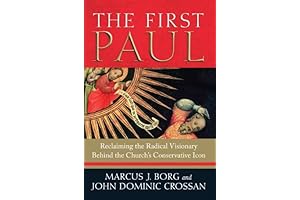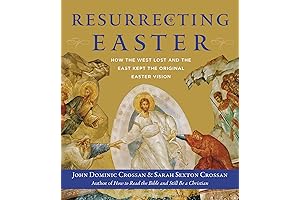· christianity · 8 min read
The Last Week: Unveiling the True Story of Jesus' Final Days
Discover the groundbreaking insights of Marcus Borg and John Dominic Crossan's "The Last Week." Dive into the historical and theological exploration of Jesus' last days in Jerusalem, gaining a fresh perspective on the Gospels.
In their acclaimed book, "The Last Week," Marcus Borg and John Dominic Crossan challenge traditional interpretations of Jesus' final days in Jerusalem. This work offers a compelling exploration of the Gospels' accounts, shedding light on the historical and theological significance of this pivotal period.
Overview

PROS
- Scholarly and well-researched, providing a comprehensive understanding of Jesus' final days.
- Presents multiple perspectives from different gospels, offering a nuanced view of the events leading up to Jesus' crucifixion.
- Challenges traditional interpretations, encouraging readers to re-evaluate their understanding of the Bible.
CONS
- May be too academic or detailed for some readers.
- Some readers may find the different perspectives confusing or contradictory.
In their thought-provoking book, 'The Last Week,' Marcus Borg and John Dominic Crossan embark on a captivating exploration of Jesus' final days. This meticulously researched work delves into the intricacies of the gospel accounts, inviting readers to question long-held assumptions and gain a fresh understanding of this pivotal period in history.
Borg and Crossan masterfully weave together historical, literary, and theological insights, presenting a multi-faceted examination of Jesus' journey to Jerusalem and his ultimate crucifixion. Their analysis is both scholarly and accessible, balancing academic rigor with engaging prose that draws readers into the heart of the narrative. By challenging traditional interpretations and offering alternative perspectives, they challenge us to re-examine our own beliefs and deepen our understanding of the Gospels.

PROS
- Provides a detailed analysis of the last week of Jesus' life
- Offers insights from two renowned scholars in biblical studies
- Presents a fresh perspective on the events leading up to the crucifixion
- Helps readers to connect with the historical and theological significance of Holy Week
CONS
- Assumes some prior knowledge of biblical studies
- May not resonate with readers seeking a more traditional interpretation of Holy Week
Marcus J. Borg and John Dominic Crossan's The Last Week is an in-depth examination of the final week of Jesus' life. Drawing on historical research and biblical scholarship, Borg and Crossan provide a fresh perspective on the events leading up to the crucifixion. Their analysis is both accessible and thought-provoking, making it a valuable resource for those seeking a deeper understanding of Holy Week.
One of the strengths of The Last Week is its detailed analysis of the historical context surrounding the crucifixion. Borg and Crossan provide a wealth of information on the political, social and religious dynamics of first-century Palestine, which helps readers to understand the complex factors that contributed to Jesus' death. They also offer insightful commentary on the various biblical texts that relate to Holy Week, providing a deeper understanding of their historical significance and theological implications.

PROS
- Provides a comprehensive examination of Paul's life and teachings.
- Offers a fresh perspective on Paul as a revolutionary thinker who challenged traditional religious norms.
CONS
- Some readers may find the academic tone slightly dry.
- The interpretation of Paul's writings is subjective and open to debate.
In "The First Paul: Reclaiming the Radical Visionary Behind the Church's Conservative Icon," Marcus Borg and John Dominic Crossan present a compelling re-evaluation of the Apostle Paul. Traditionally portrayed as a conservative figure, the authors argue that Paul was a radical visionary whose teachings were subverted and distorted by later generations of Christians.
Borg and Crossan delve into Paul's letters, examining his writings in their historical and cultural context. They uncover a Paul who challenged the established order, advocating for equality among all people, regardless of gender, ethnicity, or social status. Their interpretation highlights Paul's emphasis on grace, compassion, and the transformative power of Christ's message.

PROS
- Rigorously examines gospel accounts to reconstruct the historical context of Jesus' birth.
- Offers fresh perspectives on familiar Christmas narratives, enriching understanding of the event.
- Provides a nuanced and comprehensive exploration of the Biblical texts.
CONS
- Can be dense for casual readers or those seeking a superficial treatment of the subject.
- Lacks illustrations or visual aids, which may limit accessibility for some readers.
In the captivating pages of "The First Christmas" by Marcus Borg and John Dominic Crossan, readers embark on a thought-provoking quest to unravel the historical tapestry surrounding the birth of Jesus. Through meticulous analysis of gospel accounts, the authors present a fresh and insightful look at one of the most beloved stories in human history.
Far from a mere rehash of familiar Christmas tales, this book delves deeply into the Gospels of Matthew and Luke, examining the cultural, political, and religious forces that shaped the narratives. Borg and Crossan's expertise in biblical scholarship shines through as they shed new light on the significance of Jesus' birth within the broader context of human history. While it may challenge some preconceived notions, "The First Christmas" offers a profound and enriched understanding of the event that has captivated generations.

PROS
- Unveils contrasting Easter interpretations between East and West
- Provides a fresh perspective on the historical significance of Easter
CONS
- Some may find the theological debates too technical
- Limited focus on modern Easter practices and celebrations
Resurrecting Easter embarks on a captivating journey, excavating the divergent paths Easter has taken in the East and West. Marcus Borg and John Dominic Crossan, renowned biblical scholars, present a compelling narrative that challenges conventional understandings of the holiday's origins and meanings. By shedding light on the lost interpretations of early Christianity, they illuminate how Easter evolved into the celebration we recognize today.
The book meticulously examines the historical backdrop of Easter, delving into the cultural and theological influences that shaped its development. Borg and Crossan skillfully weave together ancient texts, archaeological findings, and scholarly insights to unravel the complex tapestry of Easter's evolution. Through their analysis, they highlight the profound impact of cultural shifts, political power dynamics, and theological controversies on the holiday's trajectory.
The Last Week presents a fresh perspective on the events leading up to and including the crucifixion and resurrection of Jesus. Borg and Crossan argue that Jesus' mission was not primarily about establishing a new religion but rather about embodying a radical vision of love and compassion. Through their meticulous research and analysis, they provide a deeper understanding of Jesus' teachings and their relevance for contemporary society.
Frequently Asked Questions
What is the central argument of "The Last Week"?
"The Last Week" challenges traditional interpretations of Jesus' final days, arguing that his mission was primarily about embodying a radical vision of love and compassion, rather than establishing a new religion.
Who are the authors of "The Last Week"?
Marcus Borg and John Dominic Crossan, renowned biblical scholars and theologians, are the authors of "The Last Week".
What is the historical significance of the Gospels' accounts of Jesus' last week?
The Gospels' accounts of Jesus' last week offer invaluable insights into the historical events and theological significance of this pivotal period, providing a basis for understanding Jesus' teachings and their impact on Christianity.
How does "The Last Week" contribute to the study of Christianity?
"The Last Week" has significantly contributed to the study of Christianity by challenging traditional interpretations and providing a deeper understanding of Jesus' life and teachings, enriching the historical and theological exploration of the Christian faith.
What is the relevance of "The Last Week" for contemporary society?
The insights of "The Last Week" remain relevant for contemporary society, reminding us of the importance of love, compassion, and the pursuit of a meaningful life, as embodied in the teachings and actions of Jesus.








